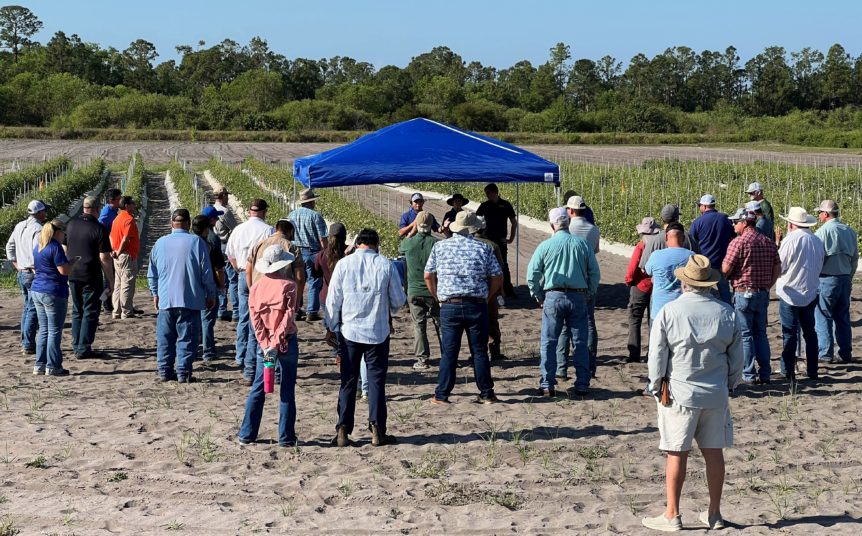
Photo courtesy of SWFREC
In June, the Southwest Florida Research and Education Center (SWFREC) hosted a spring vegetable production field day to highlight research being conducted at the center. As field day attendees disembarked from the tractor-pulled trolleys, SWFREC master’s graduate student Bryan Merlos Osorio grabbed a microphone and quickly began describing the vegetable horticulture research trial in front of them.
Among many things, he explained the importance of evaluating commercially available biostimulants and studying the effectiveness of raised-bed systems in vegetable production.
Nearly 70 growers and other industry representatives attended the event. Following welcomes from SWFREC director Mike Burton and UF/IFAS Hendry County extension director and multi-county commercial vegetable agent Craig Frey, additional in-field project updates included:
- Precision ag engineering: demonstration of an AI-enabled autonomous sprayer for weed management.
- Weed science: nutsedge control in tomato beds with pre-emergence herbicide combinations.
- Entomology: the use of insecticides and other integrated pest management techniques to control insect pests of tomato and pepper crops.
- Water resource engineering: research and extension trial that determines how much rainfall is intercepted in the plastic mulched system and available for plant use.
Indoor presentations included the soil science artificial intelligence program’s Conversational AI platform: A tool that lets growers ask simple, natural-language questions—like “Where and when should I fertilize my field?”—and get instant answers with maps and insights. By combining satellite data with AI large-language models, the tool makes advanced soil and crop information easy to access, helping users make better decisions on soil health and input application without needing technical expertise,
Additional inside talks were:
- Precision ag engineering (Yiannis Ampatzidis): cutting-edge AI-driven robotic innovations revolutionizing vegetable production, including intelligent sprayers, advanced harvesting systems, and harvest-aid technologies; AI-powered early disease detection tools that enable real-time diagnosis and targeted interventions using precision application of pesticides, significantly reducing input costs.
- Plant pathology (Pam Roberts): race and copper sensitivity of bacterial spot pathogen: diversity of the bacterial spot pathogen on pepper and sensitivity to bactericides containing copper and management.
- Entomology (Jawwad Qureshi): results from the evaluation of different chemical control programs using soil and foliar-applied insecticides for whitefly control in tomatoes.
- Vegetable horticulture (Pavlos Tsouvaltzis): the role of fertigation and specific challenges while scheduling an efficient application schedule in tomato production.
- Water resource engineering (Sanjay Shukla): phosphorus fertilizer BMPs and water management: results from an ongoing study evaluating Mehlich-3 soil test-based fertilizer recommendations for bean, potato and tomato production on commercial farms; influence of regional and site-specific factors—including the “ditch effect”—on these recommendations; brief update on research related to compact bed geometry and associated pesticide, irrigation and nutrient management.










